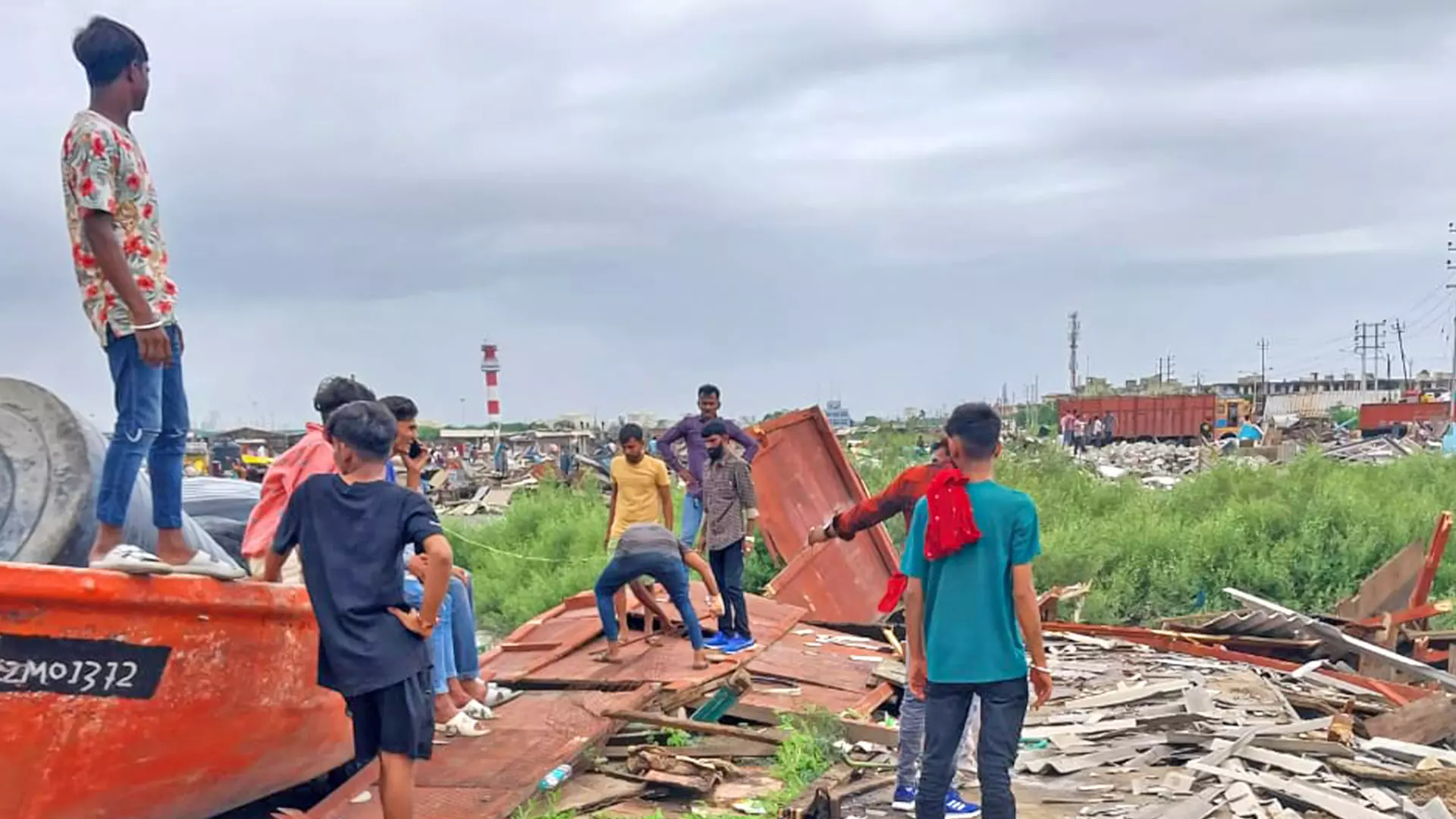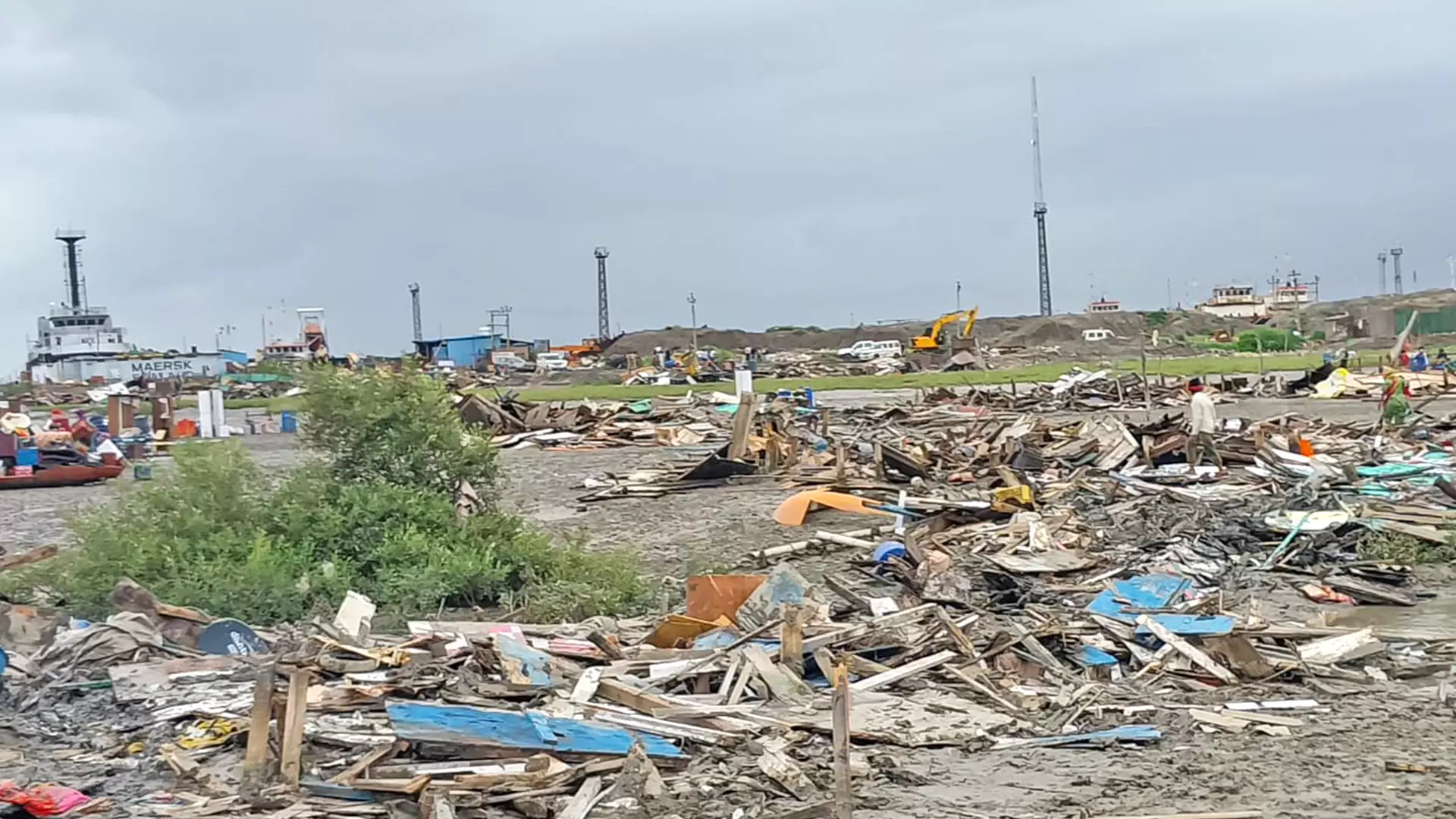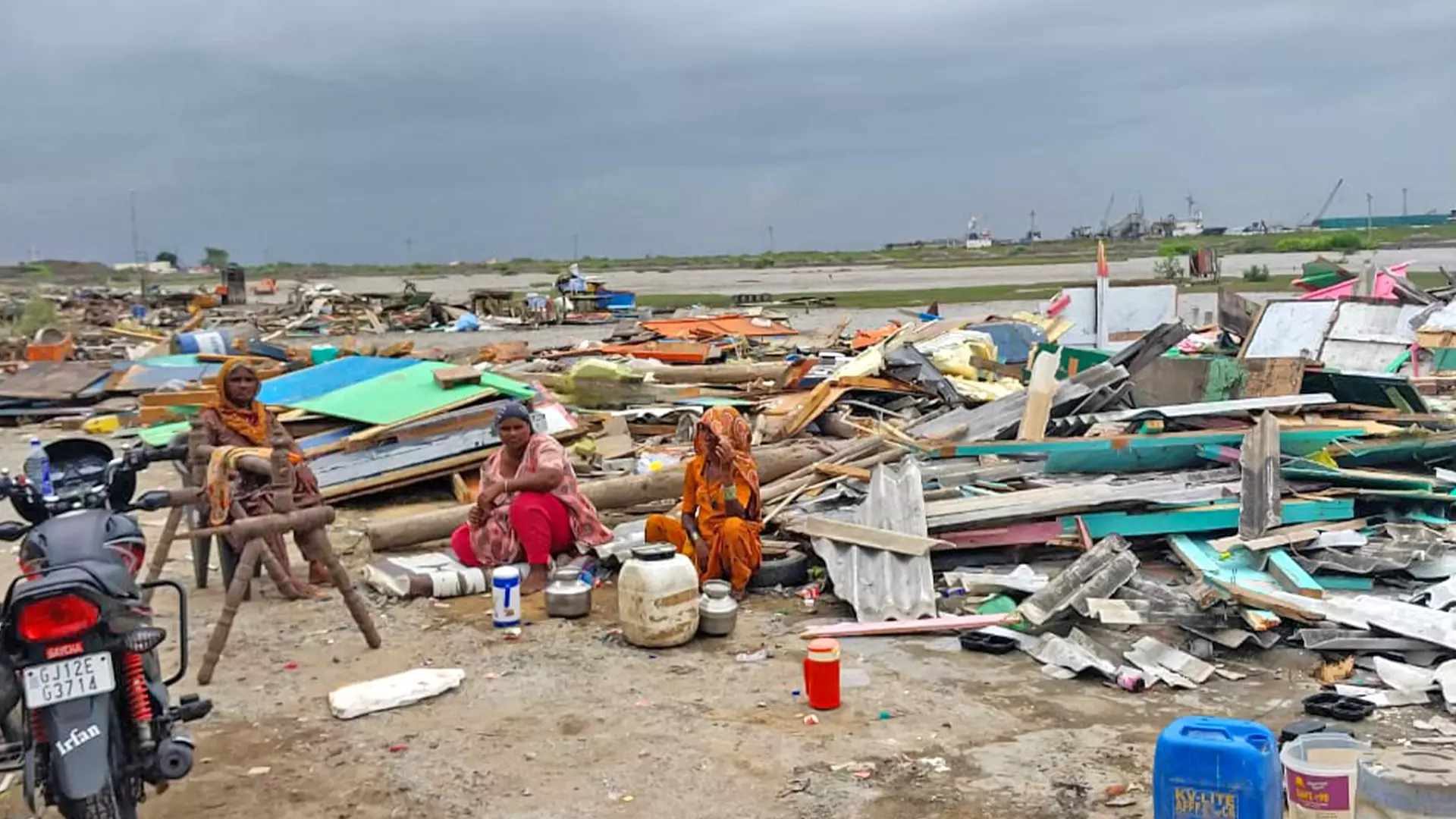
- Home
- India
- World
- Premium
- THE FEDERAL SPECIAL
- Analysis
- States
- Perspective
- Videos
- Sports
- Education
- Entertainment
- Elections
- Features
- Health
- Business
- Series
- In memoriam: Sheikh Mujibur Rahman
- Bishnoi's Men
- NEET TANGLE
- Economy Series
- Earth Day
- Kashmir’s Frozen Turbulence
- India@75
- The legend of Ramjanmabhoomi
- Liberalisation@30
- How to tame a dragon
- Celebrating biodiversity
- Farm Matters
- 50 days of solitude
- Bringing Migrants Home
- Budget 2020
- Jharkhand Votes
- The Federal Investigates
- The Federal Impact
- Vanishing Sand
- Gandhi @ 150
- Andhra Today
- Field report
- Operation Gulmarg
- Pandemic @1 Mn in India
- The Federal Year-End
- The Zero Year
- Science
- Brand studio
- Newsletter
- Elections 2024
- Events
Why Muslim fishermen across Gujarat are finding their homes demolished, dreams snatched

Rehana Banu, a 19-year-old girl from fishing community in Devbhumi Dwarka district, was to be married in the first week of June this year. She had bought herself a dress from the money that the family had saved over the years. Rehana was waiting eagerly for her 47-year-old father, fisherman Yakub Moosa Pateliya, to return from a fishing trip and begin the wedding preparations.However, on May...
Rehana Banu, a 19-year-old girl from fishing community in Devbhumi Dwarka district, was to be married in the first week of June this year. She had bought herself a dress from the money that the family had saved over the years. Rehana was waiting eagerly for her 47-year-old father, fisherman Yakub Moosa Pateliya, to return from a fishing trip and begin the wedding preparations.
However, on May 27, 2024, a week before Rehana’s wedding, her home was razed down in a demolition drive carried out by the Port Authority of Gujarat. Rehana’s wedding never happened. Her wedding dress got buried in the ruins of her home as the family did not have enough time to save their belongings after the demolition notice.
“I was looking forward to come back home for my daughter’s wedding. Instead I came back to witness ruins of bricks and mud at the place where our home once stood,” Yakub Moosa Pateliya tells The Federal.

Authorities involved in the demolitions have been destroying boats belonging to Muslim fishermen.
“There were around 100 families of Muslim fishermen living on Harshad port where we had living for over 50 years. I got married here and my children grew up here. One day they (port authority officials) came and told us that we are encroachers, and the land belongs to the port authority. Over the next few months, we lived in the fear of being evicted. Men cancelled their fishing trips to stay back home with families, incurring financial losses,” says Yakub.
“But six months passed and nobody visited us so some of us decided to go to the sea. After all, we needed money to survive. They came all of a sudden and within half an hour of the announcement, the bulldozers razed down our homes,” shares Pateliya.
Yakub, along with other families of fishermen, now lives in a makeshift hut 30 kilometres from Harshad port around a land locked dargah in Gandhvi village in Dwarka district. Most of them have lost their boats with no money for repair and maintenance.
“On the day of demolition, they broke most of our boats. Some of us managed to take the boats to safety. But it’s of no use to us. We don’t have money for repair and maintenance of our boats or to buy fuel to put together a fishing trip. I have not earned a penny since my last fishing trip in February this year. My wife and I do odd jobs to feed our children,” says Gafoor Dawood, another fisherman of Harshad port, whose home was demolished on May 27.
In a similar incident on September 6 in Kandla in Kutch district, Iftiqar Patel, a fisherman by occupation packed all his belongings from his 35-year-old home overnight before it was razed to ground.
His was one of the 50 families to be displaced from Kandla port in an eviction drive carried out by the Deendayal Port authorities. The demolition drive started on the morning of September 5 amid heavy deployment of Central Industrial Security Force (CISF) and around 550 local police personnel. Sushil Kumar Singh, the port chairman and Sagar Bagmar, the Kutch East SP, oversaw the whole process.
The authorities cited security reasons for the demolitions.
“There were illegal encroachments on the Kandla Port land, which could pose a threat for domestic as well as national security. Hence the encroachments were removed from the Port Trust land,” said Bagmar in a press conference.
Noticeably, these aren’t isolated incidents of demolition of settlements of Muslim fishermen along the coastal districts of Gujarat.
In June, the port administration demolished the homes of Muslim fishermen in Navadra village of Dwarka for port expansion. In December 2023, the 575 families found out that their names were omitted from the voters list of the area ahead of state polls.

A Muslim fishermen settlement razed to the ground.
“We lived and voted in Dwarka Assembly constituency number 249 in many previous elections for the BJP. Despite that our names were deleted from the voter list and have not been transferred to any other location in the state,” says Ibrahim Pateliya, one of the fisherman who has since been displaced.
“We were forcibly driven away by the port administration. One day before the demolitions began, we were given a notice informing us of the impending demolition. There was no time to vacate or collect our belongings. Even our boats tied near our homes were broken by the bulldozers,” he adds.
While, the authorities have been swift in carrying out demolitions, they have done nothing for the relief and rehabilitation of those displaced.
“The demolitions were carried out on the grounds of illegal construction on government land by the Muslim fishermen community. Multiple petitions for their reinstatement and resettlement are pending in the Gujarat High Court including one filed by us. We fill fight for rehabilitation of the fishermen,” says Mujahid Nafees, the convener of Minority Coordination Committee, a Gujarat based minority rights organisation.
“Since 2022, settlements belonging to Muslim fishermen across the state have been demolished and their boats destroyed. These demolition drives of structures and shacks primarily belonging to Muslim fishermen communities have been sanctioned by the Gujarat Maritime Board. The first demolition drive was carried out in Bet Dwarka, an island off the Okha coast in Gadhvi village that has a population of around 3000, most of whom depend on fishing,” Mujahid said.
“After the notice was served to the fishermen, they filed a petition in the High Court seeking to regularise their homes under a 1981 circular of the state government which provides for gamtal (huts) to fishermen living along the seacoast. But the court threw away the petition after the state government argued that the structures posed a threat to national security and cited two letters from the Additional Director of General of Police (Intelligence). Following which, the area belonging to Muslim fishermen was razed to the ground,” added Nafees.
Noticeably, the Gujarat government in a statement to the High Court had assured that the affected families will be rehabilitated according to existing policies of the government. But no action has been taken in the last two years as the families continue to live in makeshift shacks in Mul Dwarka, around 50 kilometres from their demolished homes.
In May 2022, 300 Muslim fishermen and their families from Gosabara, a coastal village in Porbandar district, approached the High Court seeking mass euthanasia on the ground that they were not allowed to undertake their traditional occupation on account of their religion.

The families displaced due to the demolition drives have received no support from the government for rehabilitation.
However, the court refused to entertain the plea. Two months later, in August, it dismissed the petition and fined the community’s lawyer for wasting the court’s time.
“Our ancestors have been living and working in the area for at least 150 years. We were originally freshwater fishermen who would fish in the lake in Gosabara and not venture into the sea. But in 2011, the Porbandar district authorities barred fishing in the lake as it was home to several species of birds who were being adversely affected by fishing. That’s when we ventured into the sea for the sake of livelihood,” says Allarakha Ismailbhai Thimmar, the fisherman who had filed the petition of mass euthanasia on behalf of his community.
“Problems began since we got licence to fish in the Arabian sea, an area that had been dominated by the Kharwas, a community of Hindu fishermen. The Kharwas took objection to the Thimmers, the Muslim fishermen carrying out any activity from the Porbandar port. They won’t let us dock our boats at the Porbandar port and the district authorities had barred us from the Gosabara port,” adds Thimmar.
“The Kharwas gang up against us, we can’t leave our boats unattended there,” shares Sabbir Hussain Adbul Sama, another fisherman from Gosabara.
“We have made several representations to district authority, Congress district office and even written petitions to the Governor but no one speaks for us. No politician wants to irk the Kharwas who form the majority in Porbandar,” adds Sama.
Around 600 kilometres from Porbandar, another Muslim fishing community is facing the same problem – resistance from the local Kharwa community.
In November 2022, the state government demolished around 300 houses, huts and godowns at Jakhau harbour in Kutch district terming them unauthorised constructions. The move came after a petition was submitted by the local Kharwa fishermen association claiming their business and livelihood were at risk due to illegal business in the area.
“We have always been in trouble with the Kharwas in Jhakhau port. Every time we would get into a feud over a docking space, the administration would take their side. After their association wrote to the district collector, some officials came to inspect the area. Within a month, all properties belonging to Muslim fishermen were demolished in Jhakhau,” Abdul Peerzada tells The Federal.
“Since our setups were demolished by the local administration, we have not been able to recover. Our children were forced to sleep in open through the winter,” says Peerzada, who is the president of the Jakhau Bandar Fishermen and Boat Association (JBFBA) and one of the 300 Muslim fishermen to lose their home and livelihood.
Noticeably, the fishing community of Jhakhau had been paying rent to the Gujarat Maritime Board (GMB) since 1972. In 2008, the GMB, without any formal order, transferred the power of collecting the rent to Jakhau village panchayat dominated by the Kharwas.
“Fishing is the only skill we know. It is traditionally and economically important to us. But given the circumstances, we feel targeted and helpless with no one to hear us. Sometimes, we think death is better,” said 58-year-old Abdur Rehman Shah, a third generation fisherman from Jhakhau.
